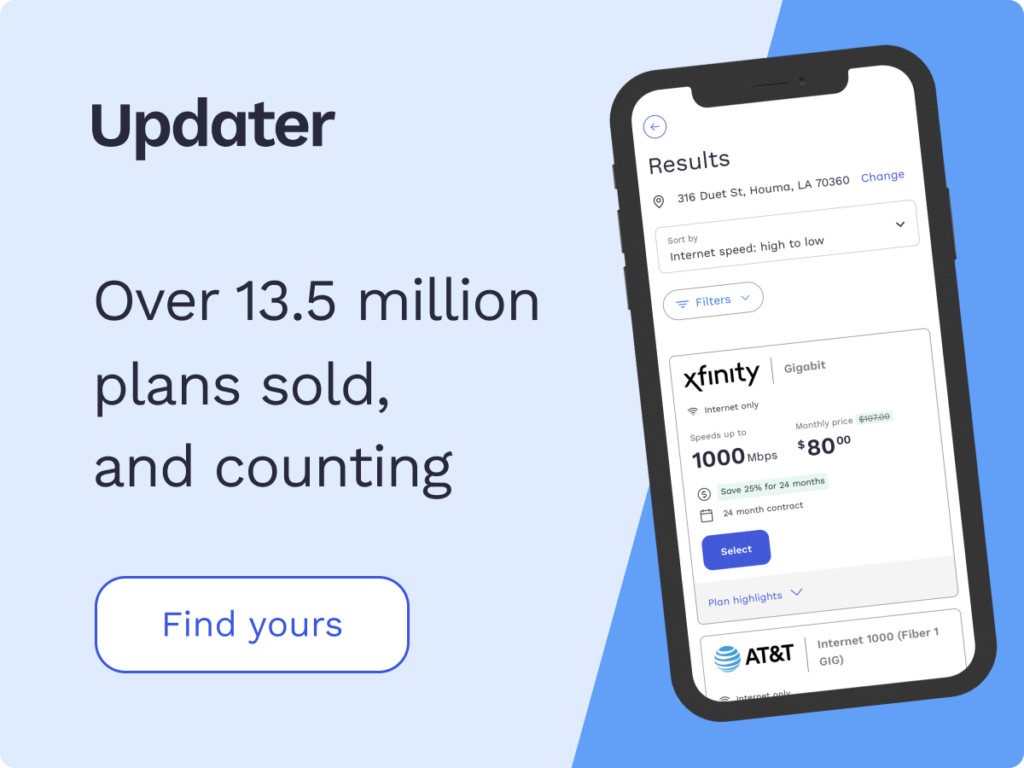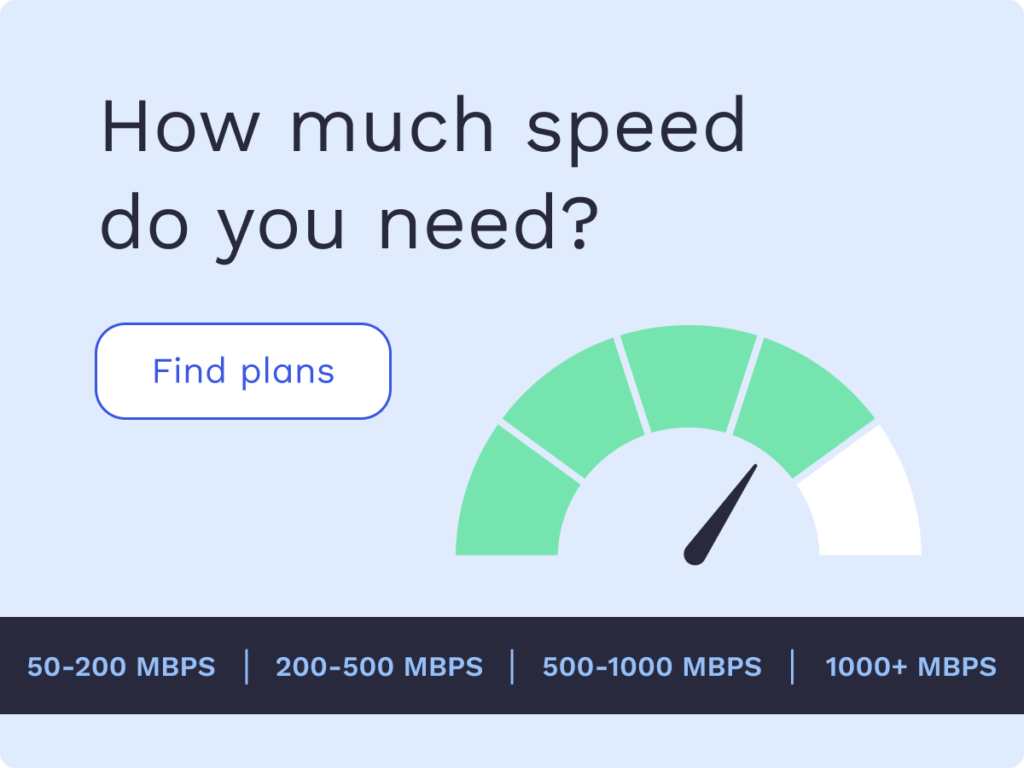What’s the Best Business Internet Provider?

Researching internet providers is not the most exciting part of starting a business, but that doesn’t make it any less important. Whether you’re running a tech startup or a brick-and-mortar business, the right internet service provider (ISP) will help keep it running. In this article, we share some top business internet recommendations and critical factors to consider when choosing an ISP.
The big players
The following are some of the most prominent players in the high-speed internet market, with packages designed to meet your business needs.
Verizon
Verizon offers the best combination of business internet speeds, support, and reliability. It offers a few business LTE plans, but none have speeds of more than 50Mbps. However, you can get better speeds with Verizon’s fiber plans if they are available in your area. Dubbed Fios, these fiber plans provide you with you near gigabit connections. You get maximum download speeds of 940Mbps and upload speeds of 880Mbps. The top plan costs $89.99/month, and all plans come with symmetric speeds. This service significantly improves videoconferencing, uploading large files to the cloud, and other activities that require sending data from your device.
AT&T
With an assured uptime of 99.9% and fiber plans with speeds of up to 5000Mbps, AT&T is undoubtedly one of the best ISPs for businesses. The ISP offers affordable no-contract plans and has a reputation for exceptional customer service. AT&T business plans come at varying speeds and price points. You can opt for their Dedicated Internet packages if you’re looking for the highest speeds with advanced features. Many of the plans offer symmetric speeds, which are great for a business that frequently uses real-time communication software and data-heavy applications.
Xfinity
Xfinity is another big player in the ISP market, operating in 39 states and offering symmetric internet speeds of up to 1000Mbps. All plans come with business-level Wi-Fi, 24/7 support, and a gateway configured with a public network that your customers can access. You can also get a static IP address at an additional cost. Connection Pro offers a 4G LTE connection for up to eight hours, while Security Edge scans your network for threats every ten minutes. As for pricing, plans range from $71.95 to $339.99/month.
Viasat
Viasat is a satellite internet provider whose widespread availability makes it a great option for rural businesses. Its main selling points are speed and availability. Viasat’s business plans come with download speeds between 35 and 100Mbps and use state-of-the-art satellite technology to minimize latency issues and keep your business going. While it has data limits, Viasat doesn’t cut off your internet access. It simply slows down your connection if you exceed the allotted daily limit. You can always upgrade your data plan if this poses a problem. The Metered Broadband plans are cheaper and top out at download speeds of 35Mbps and upload speeds of 4Mbps. While more expensive, the Unlimited plans offer maximum download speeds of 100Mbps and 4Mbps of upload.
Spectrum
Spectrum’s business internet services are contract-free and offer three download speeds – 200Mbps, 600Mbps and 940Mbps. Prices start at an affordable $49.99/month. Their business internet plans are compatible with other services, including 4G LTE backup, static IP addresses, and private Wi-Fi. You can also pair TV and phone services with your internet plan.
Frontier
Frontier is the best business internet if you want cheap but fast download speeds. The ISP serves 38 states, offering internet through DSL (digital subscriber lines) and fiber optic connections. You can get a standard fiber connection for as low as $49.99/month for 500Mbps and for $149/month you’ll get download speeds of 940Mbps. No-contract plans are available if you want flexibility, and so are broadband options for businesses in rural areas.
Key considerations
With so many ISPs touting their offerings, finding the right fit for your business can be challenging. Below are some key considerations that will make the search a little less overwhelming.
Type of connection
Some of the options you’ll come across include:
- Digital Subscriber Line (DSL) is typically the cheapest type of connection, and there are a variety of speeds to choose from. However, the speed of your DSL connection will be weaker the further you are from your provider.
- Satellite internet is widely available across the US, making it an ideal option for underserved markets. However, it’s slower and can be less reliable than other types of connections.
- Cellular technology is an excellent option if you’re in a rural area without many other options.
- Cable internet is faster than DSL, but speeds depend on how many people are using the same connection. You can expect slower speeds if you’re trying to teleconference when many others are online.
- Fiber-optic is generally the fastest and most reliable internet connection. On the downside, it’s more expensive and not available everywhere.
Download and upload speed
No one wants to spend hours trying to upload a file to the cloud. Time is money, more so when running a successful business. It’s essential to consider the speed needs for your business. Otherwise, you could end up paying for too much or too little. It’s worth noting that the download and upload speeds of fiber-optic connections are usually equal, and this is a considerable advantage over DSL connections.
Here are some speed ranges and what they can typically handle:
- 15-25Mbps will suffice if you’re running a small business with one or two employees and need basic internet for browsing online, email, and light file transfers.
- 25-50Mbps is ideal for a five-person office that makes large file transfers and point-of-sale transactions. This speed range would also make video conferencing and other communications run smoothly.
- 50-75Mbps will allow your employees to collaborate online with very few glitches. It would also offer increased transfer stability and improved data backup capabilities.
- 75-100Mbps is a great range for businesses whose employee numbers are in the double digits. It can handle crowded usage and heavy video and audio streaming demands.
- 100-150Mbps will accommodate the increasing internet demands of a rapidly growing business, i.e., increased data usage, more employees and e-commerce.
- 150-500Mbps can accommodate all of the above needs, which is crucial when you have increased employee counts and data demands.
Availability
This is the most significant deciding factor for businesses in rural areas. A higher-speed cable or fiber-optic connection won’t be any good if the provider doesn’t serve your location. Moreover, DSL and cable internet availability may be limited in areas where service lines are not yet established. In such cases, construction and installation of the service may take up to six months. When shopping for a business ISP, it’s essential to consider these availability and timeframe caveats.
Cost
An ISP should provide a good balance between pricing and speeds to make sense for your business. For instance, a plan worth $1,000/month that offers a dedicated fiber connection is probably not worth it if you run a small business out of your home. However, the same connection might be a no-brainer for a rapidly growing business with 25 employees. It all comes down to the requirements of your business.
Reliability
Reliable internet is vital for businesses that cannot afford internet service interruptions. So, it’s best to go with an ISP that offers a service level agreement (SLA). This is a contract that specifies how reliable the internet connection should be. It goes hand in hand with customer service, i.e., how fast you’ll get back up and running if something ever goes wrong with your connection.
Additional features to ask about
Speed is not everything when it comes to internet plan features. You may want to inquire about the following as well.
- Average yearly uptime: Most companies promise 99.99% but may not deliver. This is where an SLA comes in. It will allow you to pursue compensation in the form of discounts, early contract terminations, or credits if the ISP doesn’t meet your uptime expectations.
- Contract length: Most ISPs require a 2-year commitment, but some have shorter contract terms. It’s also a good idea to inquire about termination fees and free trials.
- Data caps: Some ISPs impose data caps and charge you more or slow down your connection if you exceed the allotted data limit. It’s something to watch out for if your company is broadband hungry.
What others are saying
Verizon
“There’s a reason Verizon Fios is consistently ranked No. 1 in customer satisfaction. Its 100% fiber network, superior speeds, and flexible no-contract plans set it apart from other industry-leading fiber providers.” – ZDNet.com
AT&T
“In other words, recommending AT&T internet comes down to where you live and what’s available at your address. If AT&T fiber is an option, then move it right to the top of your list.” – CNET
Xfinity
“Xfinity is the one broadband service most likely to offer fast service across America, meaning it’s also the one most likely to let people keep the same connection when moving from one place to another. That’s a major advantage.” – USNews.com
Viasat
“Viasat internet may not be as fast as some other internet service providers (ISPs), but in many rural areas, their satellite internet will comfortably surpass the existing network, assuming there is one.” – Chamber of Commerce
Spectrum
“One of the biggest benefits of Spectrum internet is that there are no data caps. This means users do not have to pay extra based on their usage.” – ZDNet
Frontier
“A business lucky enough to be in an area where Frontier offers fiber optic internet can get the benefits of a fast, fiber optic ‘symmetric’ connection at the cheapest price available ($29.99). ” – Chamber of Commerce
Business internet provider FAQs
What is high-speed internet?
There is no indisputable definition for this term and nearly all internet plans come with this description. That said, technology evolves quickly and what was considered fast internet in 2005 is slow by today’s standards. The most important thing is to ensure you have sufficient internet speeds for your business needs.
What is bandwidth, and how much do I need?
Bandwidth is the maximum capacity of a connection to carry data. ISPs use speed when marketing their products, but in reality, they sell bandwidth. For instance, a 500Mbps plan can deliver 500 megabits per second. The amount of bandwidth you need depends on the type and frequency of your business’s internet activity every day.
What else should I consider when choosing a business internet provider?
Customer and industry ratings can help you understand how a potential ISP handles complaints and concerns. Most ISPs offer bundled deals that allow you to save on the cost of phone, TV, VoIP, and other services.
*Pricing varies by location and availability. Speeds may vary. All prices subject to change; for current pricing and availability visit our internet service page. Prices as of 6/1/22.
Disclosure | Updater articles are based on our own data and research, independent from partner relationships. We are not compensated by partners for information and opinions presented here. Our Editorial Terms of Service can be found here.














